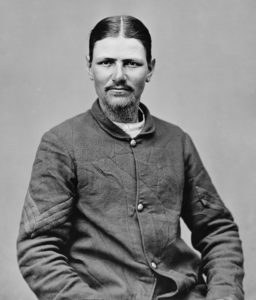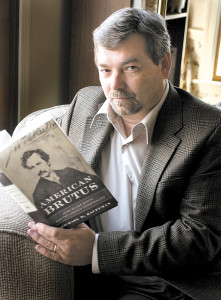What happened to the man who shot John Wilkes Booth?

One of the lingering mysteries of the Lincoln assassination concerns Boston Corbett, the man who shot John Wilkes Booth. In 1888, Corbett disappeared into thin air. Michael W. Kauffman, a Lincoln assassination scholar, joins us today with a guest post on this strange and historical case. Kauffman wrote American Brutus: John Wilkes Booth and the Lincoln Conspiracies and contributed a chapter to The Lincoln Assassination Riddle: Revisiting the Crime of the Nineteenth Century.
Welcome Michael W. Kauffman!
A historical disappearance
Boston Corbett’s disappearance is one of many mysteries connected to the Lincoln assassination, and it’s one that will probably never be solved. Corbett was last seen in the town of Neodesha, Kansas, where he had gone to visit a friend named Richard Thatcher, whom he had known when both were prisoners of war at Andersonville during the Civil War.
Boston Corbett after the Civil War
Corbett had drifted from one job to another after the war, dogged by the feeling that he would fall victim to revenge at the hands of John Wilkes Booth’s friends. Celebrity hadn’t suited him well. After a brief and unsuccessful career as a lecturer, he became a minister of the gospel. He was probably a bit too intense for most parishioners, and before long he headed west and took up residence on a grant of land in Cloud County, Kansas. His behavior became increasingly erratic, and in time he came to be regarded as a public menace and a danger to society. But mindful of his status as a national hero, officials in Cloud County came up with a novel way of getting rid of Corbett while appearing to pay him an honor: they arranged to make him an assistant doorkeeper to the state legislature in Topeka! (Keep in mind, they did this because they considered him dangerous.)
Corbett lands in an asylum
It wasn’t long before Boston Corbett wore out his welcome in Topeka. He took offense to some remarks and drew his revolvers in the state house. The men in the white coats came to get him, and after a brief hearing, he was committed to the State Asylum for the Insane.
Apparently, Corbett felt the institution had little to offer, and he availed himself of the first opportunity to escape. He disappeared in short order, and made his way to Neodesha, in the southeast part of the state. There his old war buddy, Thatcher, extended a warm welcome and an invitation to stay a while. But after making some noises about heading for Mexico, Corbett disappeared into the wilderness, and as far as is known, he was never seen again.
Various theories about Boston Corbett
The western frontier was vast and forbidding, and it doesn’t take much imagination to guess what might have happened to Boston Corbett as he made his way south. Starvation, hostile Indians, marauders, and dangerous animals were only a few of the hazards any traveler would have to face in the Old West. Travelling alone was especially dangerous, and the odds of survival in the wilderness were extremely poor. Wild animals would have left little trace of anyone who died in such a vast expanse.
All of which is to say that it probably surprised no one when Corbett failed to materialize in Mexico or anywhere else in subsequent years. Though there were pretenders — most notably a patent medicine salesman in Enid, Oklahoma who was imprisoned for fraudulently claiming Corbett’s pension — the real Boston Corbett was never seen for certain again.
Great Hinckley Fire
But there were stories that suggested otherwise. In September of 1894, a forest fire consumed more than 200,000 acres around the town of Hinckley, Minnesota, and among the more than 400 fatalities was a man identified as Thomas Corbett. That was actually Boston Corbett’s given name, and it didn’t take long for rumors to take root about the death of Lincoln’s avenger in the Great Hinckley Fire. But in truth, this was never more than a rumor, based solely on the name of a man who seemed to be a stranger to the people of Hinckley. Attempts to connect that stranger to the killer of John Wilkes Booth have fallen flat for lack of evidence.
But as a wise old friend once told me, mysteries are a good thing. They give us something to talk about and to keep us interested. If you can supply all the answers, everyone will just get bored and move on to another topic. Nevertheless, if anyone can shed more light on the fate of Boston Corbett, I’d be delighted to hear about it.

Thank you, Michael W. Kauffman!
Which theory do you think is most likely?
If you want to read more about the Lincoln assassination, check out my interview of Michael W. Kauffman.
Michael W. Kauffman also offered a blurb for the back cover of my book, Death of an Assassin: The True Story of the German Murderer Who Died Defending Robert E. Lee:
Death of an Assassin is not only a startling historical discovery but a poignant tale of heroism and redemption. With a marvelous eye for detail, Ann Marie Ackermann has navigated through long-forgotten records on both sides of the Atlantic to unearth a new and complex kind of hero – a brutish, vengeful man who, perhaps out of remorse, was anxious to start a new life and redeem himself in his adopted home. It’s a great story, bolstered by solid research and told by one who is uniquely qualified to bring it to the public.
Click on the link above to order the book.




Very interesting, would love to read the book.
Thanks, Angelina! I’m not sure there is a book on Boston Corbett himself, but Michael Kauffman’s American Brutus is a very good read.
It is more than conjecture that Boston Corbett died in the Hinckley fire. In fact, this rumor grew legs only after the great reliance on things found on the Interwebs being reported as fact.
The true facts are that no one knows what became of Boston Corbett or where he might have died. Things that work against his death in the Hinckley fire, are:
(1) All of the listed dead in the Hinckley fire were positively identified. Bodies that were burned beyond recognition, were listed as unidentified.
(2) There were more than few Corbett families living in the Hinckely area at the time of the fire. The Thomas Corbett identified was most probably from one of those families, none of which are related to Boston Corbett.
(3) Boston Corbett was what many would call a religious zealot and took the words in the Bible true to heart. To think that he would lie, in the face of God, to a long-time friend about where he was headed (Mexico) and instead turned north to Minnesota (even after boarding a southbound train) is a stretch by any means of the imagination.
* It is more likely than not that Boston Corbett stayed to to his word and headed to Mexico as he said. However, border towns in Mexico at the time were full of former Confederate soldiers with whom he would find disagreeable to live among. He would need to head further into Mexico in order to live to a rip old age.
Thanks for posting your perspectives, which are thought-provoking. Unfortunately, some things in history will forever remain a mystery. I’m curious about your last name — are you related to Boston Corbett?
No relation as far as our family can find. Ironically though, I am a generational cousin of President Lincoln.
Fascinating! That’s an even more interesting connection than with Boston Corbett!
there is one book published about him, “Madman and the Assassin” by Scott Martelle, it is helpful and full of information, my grandparents and i believe we are related to Corbett, and so far, everything we learned so far is good proof!
Thanks for the tip about the book, Rhett! If you find out anything more about Corbett and your relationship to him, let me know. Maybe I could interview you for a new blog post!
Does one think that because he was a self-inflicted eunich that this could have something to do with his erratic behavior? Just saying.
Was he a self-inflicted eunich? I didn’t know that…. I tend to think that it went the other way around — that his erratic behavior contributed to his mutilating himself, and not the other way around. I’ll ask Michael Kaufmann to comment.
I am in fact a distant relative. Proven via dna testing. And i would love to know more about my close ansestor.
Whoa, that is fascinating! I’m not a Corbett historian myself — I just interviewed one. For a starter, you might want to contact the person who wrote this blog post. Good luck digging up the information on that branch of the family tree!